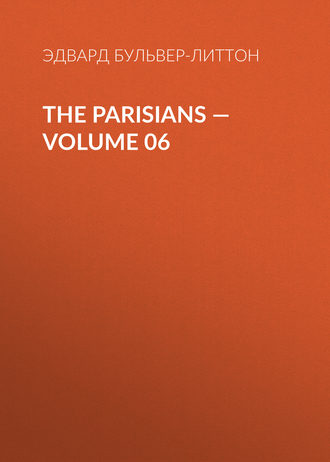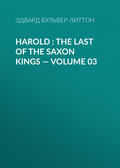
Эдвард Бульвер-Литтон
The Parisians — Volume 06
As soon as the affairs connected with this inheritance permitted, I returned to Paris, and again saw M. Sartiges. I had never heard from Louise, nor from any one connected with her since the letter you have read. No steps had been taken to annul the marriage, and sufficient time had elapsed to render it improbable that such steps would be taken now; but if no such steps were taken, however free from the marriage-bond Louise might be, it clearly remained binding on myself.
At my request, M. Sartiges took the most vigorous measures that occurred to him to ascertain where Louise was, and what and who was the relation with whom she asserted she had found refuge. The police were employed; advertisements were issued, concealing names, but sufficiently clear to be intelligible to Louise if they came under her eye, and to the effect that if any informality in our marriage existed, she was implored for her own sake to remove it by a second ceremonial—answer to be addressed to the avoue. No answer came; the police had hitherto failed of discovering her, but were sanguine of success, when a few weeks after these advertisements a packet reached M. Sartiges, enclosing the certificates annexed to this letter, of the death of Louise Duval at Munich. The certificates, as you will see, are to appearance. officially attested and unquestionably genuine. So they were considered by M. Sartiges as well as by myself. Here, then, all inquiry ceased; the police were dismissed. I was free. By little and little I overcame the painful impressions which my ill-starred union and the announcement of Louise's early death bequeathed. Rich, and of active mind, I learned to dismiss the trials of my youth as a gloomy dream. I entered into public life; I made myself a creditable position; became acquainted with your aunt; we were wedded, and the beauty of her nature embellished mine. Alas, alas! two years after our marriage—nearly five years after I had received the certificates of Louise's death—I and your aunt made a summer excursion into the country of the Rhine; on our return we rested at Aix-la-Chapelle. One day while there I was walking alone in the environs of the town, when, on the road, a little girl, seemingly about five years old, in chase of a butterfly, stumbled and fell just before my feet; I took her up, and as she was crying more from the shock of the fall than any actual hurt, I was still trying my best to comfort her, when a lady some paces behind her came up, and in taking the child from my arms as I was bending over her, thanked me in a voice that made my heart stand still. I looked up, and beheld Louise.
It was not till I had convulsively clasped her hand and uttered her name that she recognized me. I was, no doubt, the more altered of the two,— prosperity and happiness had left little trace of the needy, care worn, threadbare student. But if she were the last to recognize, she was the first to recover self-possession. The expression of her face became hard and set. I cannot pretend to repeat with any verbal accuracy the brief converse that took place between us, as she placed the child on the grass bank beside the path, bade her stay there quietly, and walked on with me some paces as if she did not wish the child to hear what was said.
The purport of what passed was to this effect: She refused to explain the certificates of her death further than that, becoming aware of what she called the "persecution" of the advertisements issued and inquiries instituted, she had caused those documents to be sent to the address given in the advertisement, in order to terminate all further molestation. But how they could have been obtained, or by what art so ingeniously forged as to deceive the acuteness of a practised lawyer, I know not to this day. She declared, indeed, that she was now happy, in easy circumstances, and that if I wished to make some reparation for the wrong I had done her, it would be to leave her in peace; and in case— which was not likely—we ever met again, to regard and treat her as a stranger; that she, on her part, never would molest me, and that the certified death of Louise Duval left me as free to marry again as she considered herself to be.
My mind was so confused, so bewildered, while she thus talked, that I did not attempt to interrupt her. The blow had so crushed me that I scarcely struggled under it; only, as she turned to leave me, I suddenly recollected that the child, when taken from my arms, had called her "Maman," and, judging by the apparent age of the child, it must have been born but a few months after Louise had left me,—that it must be mine. And so, in my dreary woe, I faltered out, "But what of your infant? Surely that has on me a claim that you relinquish for yourself. You were not unfaithful to me while you deemed you were my wife?"
"Heavens! can you insult me by such a doubt? No!" she cried out, impulsively and haughtily. "But as I was not legally your wife, the child is not legally yours; it is mine, and only mine. Nevertheless, if you wish to claim it"—here she paused as in doubt. I saw at once that she was prepared to resign to me the child if I had urged her to do so. I must own, with a pang of remorse, that I recoiled from such a proposal. What could I do with the child? How explain to my wife the cause of my interest in it? If only a natural child of mine, I should have shrunk from owning to Janet a youthful error. But as it was,—the child by a former marriage, the former wife still living!— my blood ran cold with dread. And if I did take the child, invent what story I might as to its parentage, should I not expose myself, expose Janet, to terrible constant danger? The mother's natural affection might urge her at any time to seek tidings of the child, and in so doing she might easily discover my new name, and, perhaps years hence, establish on me her own claim.
No, I could not risk such perils. I replied sullenly, "You say rightly; the child is yours,—only yours." I was about to add an offer of pecuniary provision for it, but Louise had already turned scornfully towards the bank on which she bad left the infant. I saw her snatch from the child's hand some wild flowers the poor thing had been gathering; and how often have I thought of the rude way in which she did it,—not as a mother who loves her child. Just then other passengers appeared on the road; two of them I knew,—an English couple very intimate with Lady Janet and myself. They stopped to accost me, while Louise passed by with the infant towards the town. I turned in the opposite direction, and strove to collect my thoughts. Terrible as was the discovery thus suddenly made, it was evident that Louise had as strong an interest as myself to conceal it. There was little chance that it would ever be divulged. Her dress and that of the child were those of persons in the richer classes of life. After all, doubtless, the child needed not pecuniary assistance from me, and was surely best off under the mother's care. Thus I sought to comfort and to delude myself.
The next day Janet and I left Aix-la-Chapelle and returned to England. But it was impossible for me to banish the dreadful thought that Janet was not legally my wife; that could she even guess the secret lodged in my breast she would be lost to me forever, even though she died of the separation (you know well how tenderly she loved me). My nature underwent a silent revolution. I had previously cherished the ambition common to most men in public life,—the ambition for fame, for place, for power. That ambition left me; I shrank from the thought of becoming too well known, lest Louise or her connections, as yet ignorant of my new name, might more easily learn what the world knew; namely that I had previously borne another name,—the name of her husband,—and finding me wealthy and honoured, might hereafter be tempted to claim for herself or her daughter the ties she adjured for both while she deemed me poor and despised. But partly my conscience, partly the influence of the angel by my side, compelled me to seek whatever means of doing good to others position and circumstances placed at my disposal. I was alarmed when even such quiet exercise of mind and fortune acquired a sort of celebrity. How pain fully I shrank from it! The world attributed my dread of publicity to unaffected modesty. The world praised me, and I knew myself an impostor. But the years stole on. I heard no more of Louise or her child, and my fears gradually subsided. Yet I was consoled when the two children born to me by Janet died in their infancy. Had they lived, who can tell whether something might not have transpired to prove them illegitimate.
I must hasten on. At last came the great and crushing calamity of my life,—I lost the woman who was my all in all. At least she was spared the discovery that would have deprived me of the right of tending her deathbed, and leaving within her tomb a place vacant for myself.
But after the first agonies that followed her loss, the conscience I had so long sought to tranquillize became terribly reproachful. Louise had forfeited all right to my consideration, but my guiltless child had not done so. Did it live still? If so, was it not the heir to my fortunes, —the only child left to me? True, I have the absolute right to dispose of my wealth: it is not in land; it is not entailed: but was not the daughter I had forsaken morally the first claimant; was no reparation due to her? You remember that my physician ordered me, some little time after your aunt's death, to seek a temporary change of scene. I obeyed, and went away no one knew whither. Well, I repaired to Paris; there I sought M. Sartiges, the avoue. I found he had been long dead. I discovered his executors, and inquired if any papers or correspondence between Richard Macdonald and himself many years ago were in existence. All such documents, with others not returned to correspondents at his decease, had been burned by his desire. No possible clew to the whereabouts of Louise, should any have been gained since I last saw her, was left. What then to do I knew not. I did not dare to make inquiries through strangers, which, if discovering my child, might also bring to light a marriage that would have dishonoured the memory of my lost saint. I returned to England, feeling that my days were numbered. It is to you that I transmit the task of those researches which I could not institute. I bequeath to you, with the exception of trifling legacies and donations to public charities, the whole of my fortune; but you will understand by this letter that it is to be held on a trust which I cannot specify in my will. I could not, without dishonouring the venerated name of your aunt, indicate as the heiress of my wealth a child by a wife living at the time I married Janet. I cannot form any words for such a devise which would not arouse gossip and suspicion, and furnish ultimately a clew to the discovery I would shun. I calculate that, after all deductions, the sum that will devolve to you will be about L220,000. That which I mean to be absolutely and at once yours is the comparatively trifling legacy of L20,000. If Louise's child be not living, or if you find full reason to suppose that despite appearances the child is not mine, the whole of my fortune lapses to you; but should Louise be surviving and need pecuniary aid, you will contrive that she may have such an annuity as you may deem fitting, without learning whence it come. You perceive that it is your object, if possible, even more than mine, to preserve free from slur the name and memory of her who was to you a second mother. All ends we desire would be accomplished could you, on discovering my lost child, feel that, without constraining your inclinations, you could make her your wife. She would then naturally share with you my fortune, and all claims of justice and duty would be quietly appeased. She would now be of age suitable to yours. When I saw her at Aix she gave promise of inheriting no small share of her mother's beauty. If Louise's assurance of her easy circumstances were true, her daughter has possibly been educated and reared with tenderness and care. You have already assured me that you have no prior attachment. But if, on discovering this child, you find her already married, or one whom you could not love nor esteem, I leave it implicitly to your honour and judgment to determine what share of the L200,000 left in your hands should be consigned to her. She may have been corrupted by her mother's principles. She may—Heaven forbid! —have fallen into evil courses, and wealth would be misspent in her hands. In that case a competence sufficing to save her from further degradation, from the temptations of poverty, would be all that I desire you to devote from my wealth. On the contrary, you may find in her one who, in all respects, ought to be my chief inheritor. All this I leave in full confidence to you, as being, of all the men I know, the one who unites the highest sense of honour with the largest share of practical sense and knowledge of life. The main difficulty, whatever this lost girl may derive from my substance, will be in devising some means to convey it to her so that neither she nor those around her may trace the bequest to me. She can never be acknowledged as my child,—never! Your reverence for the beloved dead forbids that. This difficulty your clear strong sense must overcome; mine is blinded by the shades of death. You too will deliberately consider how to institute the inquiries after mother and child so as not to betray our secret. This will require great caution. You will probably commence at Paris, through the agency of the police, to whom you will be very guarded in your communications. It is most unfortunate that I have no miniature of Louise, and that any description of her must be so vague that it may not serve to discover her; but such as it is, it may prevent your mistaking for her some other of her name. Louise was above the common height, and looked taller than she was, with the peculiar combination of very dark hair, very fair complexion, and light-gray eyes. She would now be somewhat under the age of forty. She was not without accomplishments, derived from the companionship with her father. She spoke English fluently; she drew with taste, and even with talent. You will see the prudence of confining research at first to Louise, rather than to the child who is the principal object of it; for it is not till you can ascertain what has become of her that you can trust the accuracy of any information respecting the daughter, whom I assume, perhaps after all erroneously, to be mine. Though Louise talked with such levity of holding herself free to marry, the birth of her child might be sufficient injury to her reputation to become a serious obstacle to such second nuptials, not having taken formal steps to annul her marriage with myself. If not thus remarried, there would be no reason why she should not resume her maiden name of Duval, as she did in the signature of her letter to me: finding that I had ceased to molest her by the inquiries, to elude which she had invented the false statement of her death. It seems probable, therefore, that she is residing somewhere in Paris, and in the name of Duval. Of course the burden of uncertainty as to your future cannot be left to oppress you for an indefinite length of time. If at the end, say, of two years, your researches have wholly failed, consider three-fourths of my whole fortune to have passed to you, and put by the fourth to accumulate, should the child afterwards be discovered, and satisfy your judgment as to her claims on me as her father. Should she not, it will be a reserve fund for your own children. But oh, if my child could be found in time! and oh, if she be all that could win your heart, and be the wife you would select from free choice! I can say no more. Pity me, and judge leniently of Janet's husband.
R. K.
The key to Graham's conduct is now given,—the deep sorrow that took him to the tomb of the aunt he so revered, and whose honoured memory was subjected to so great a risk; the slightness of change in his expenditure and mode of life, after an inheritance supposed to be so ample; the abnegation of his political ambition; the subject of his inquiries, and the cautious reserve imposed upon them; above all, the position towards Isaura in which he was so cruelly placed.
Certainly, his first thought in revolving the conditions of his trust had been that of marriage with this lost child of Richard King's, should she be discovered single, disengaged, and not repulsive to his inclinations. Tacitly he subscribed to the reasons for this course alleged by the deceased. It was the simplest and readiest plan of uniting justice to the rightful inheritor with care for a secret so important to the honour of his aunt, of Richard King himself,—his benefactor,—of the illustrious house from which Lady Janet had sprung. Perhaps, too, the consideration that by this course a fortune so useful to his career was secured was not without influence on the mind of a man naturally ambitious. But on that consideration he forbade himself to dwell. He put it away from him as a sin. Yet, to marriage with any one else, until his mission was fulfilled, and the uncertainty as to the extent of his fortune was dispelled, there interposed grave practical obstacles. How could he honestly present himself to a girl and to her parents in the light of a rich man, when in reality he might be but a poor man? How could he refer to any lawyer the conditions which rendered impossible any settlement that touched a shilling of the large sum which at any day he might have to transfer to another? Still, when once fully conspicuous how deep was the love with which Isaura had inspired him, the idea of wedlock with the daughter of Richard King, if she yet lived and was single, became inadmissible. The orphan condition of the young Italian smoothed away the obstacles to proposals of marriage which would have embarrassed his addresses to girls of his own rank, and with parents who would have demanded settlements. And if he had found Isaura alone on that day on which he had seen her last, he would doubtless have yielded to the voice of his heart, avowed his love, wooed her own, and committed both to the tie of betrothal. We have seen how rudely such yearnings of his heart were repelled on that last interview. His English prejudices were so deeply rooted, that, even if he had been wholly free from the trust bequeathed to him, he would have recoiled from marriage with a girl who, in the ardour for notoriety, could link herself with such associates as Gustave Rameau, by habits a Bohemian, and by principles a Socialist.
In flying from Paris, he embraced the resolve to banish all thought of wedding Isaura, and to devote himself sternly to the task which had so sacred a claim upon him. Not that he could endure the idea of marrying another, even if the lost heiress should be all that his heart could have worshipped, had that heart been his own to give; but he was impatient of the burden heaped on him,—of the fortune which might not be his, of the uncertainty which paralyzed all his ambitious schemes for the future.
Yet, strive as he would—and no man could strive more resolutely—he could not succeed in banishing the image of Isaura. It was with him always; and with it a sense of irreparable loss, of a terrible void, of a pining anguish.
And the success of his inquiries at Aix-la-Chapelle, while sufficient to detain him in the place, was so slight, and advanced by such slow degrees, that it furnished no continued occupation to his restless mind. M. Renard was acute and painstaking. But it was no easy matter to obtain any trace of a Parisian visitor to so popular a Spa so many years ago. The name Duval, too, was so common, that at Aix, as we have seen at Paris, time was wasted in the chase of a Duval who proved not to be the lost Louise. At last M. Renard chanced on a house in which, in the year 1849, two ladies from Paris had lodged for three weeks. One was named Madame Duval, the other Madame Marigny. They were both young, both very handsome, and much of the same height and colouring. But Madame Marigny was the handsomer of the two. Madame Duval frequented the gaming-tables and was apparently of very lively temper. Madame Marigny lived very quietly, rarely or never stirred out, and seemed in delicate health. She, however, quitted the apartment somewhat abruptly, and, to the best of the lodging-house-keeper's recollection, took rooms in the country near Aix—she could not remember where. About two months after the departure of Madame Marigny, Madame Duval also left Aix, and in company with a French gentleman who had visited her much of late,—a handsome man of striking appearance. The lodging house-keeper did not know what or who he was. She remembered that he used to be announced to Madame Duval by the name of M. Achille. Madame Duval had never been seen again by the lodging-house-keeper after she had left. But Madame Marigny she had once seen, nearly five years after she had quitted the lodgings,—seen her by chance at the railway station, recognized her at once, and accosted her, offering her the old apartment. Madame Marigny had, however, briefly replied that she was only at Aix for a few hours, and should quit it the same day.







